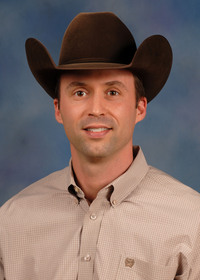Information Possibly Outdated
The information presented on this page was originally released on April 20, 1998. It may not be outdated, but please search our site for more current information. If you plan to quote or reference this information in a publication, please check with the Extension specialist or author before proceeding.
Urban Dwellers Still Learn From Horses
MISSISSIPPI STATE -- Most horses no longer help plow fields or herd livestock, but they can still teach children, even urban dwellers, responsibility.
Horse ownership is no longer limited to people who live on farms. In fact, equine industry watchers are noting a trend toward owners boarding horses with other people.
Mary Ford, an instructor for the equine research and education unit at the North Mississippi Research and Extension Center in Verona, is an example of this growing trend. Mississippi State University's College of Veterinary Medicine funded her position because of the growth in the equine industry, especially in urban settings.
"There is an attraction to horses that many people find irresistible, even if they don't live on a farm. But there is a lot more to consider with horse ownership than with owning other pets," Ford said.
"Horses require a tremendous amount of energy. They aren't even in the same ballpark as dogs or cats," she said. "Horses are excellent for teaching children responsibility. Owners need to be able to roll up their sleeves and do the work for their animals."
Ford said parents should help children understand cleaning, care and safety issues before investing in a horse. Living in town need not end dreams of horse ownership, but it should raise some significant issues.
"If the boarding facility is too far away, it will make it more difficult to give the horse the attention it needs," Ford said. "Horses need human interaction on a regular basis to respect their owner. They aren't like a four-wheeler or boat that you only get out on pretty days."
Boarding options vary greatly. Owners should base their choices on their planned uses for their horses.
"A horse kept only for pleasure riding will not need as much attention as a show animal," Ford said. "Show horses need more attention on a regular basis. Owners also may be ready to spend more money for show horses than for others."
Boarding facilities may bill for full or partial boarding. Full boarding would cover stable care, feed and water, and an exercise program. Partial boarding may eliminate the exercise service and/or stable care.
Marc Payne of Monroe County, owner of Payne's Quarter Horses, tries to meet the needs of city people who want to own a horse. He runs a boarding facility with more than 30 horses. He has found it easier to manage the feeding and stabling issues, but owners have the option of an exercise program.
Payne grew up in the 4-H youth program and believes in the value of working with horses from an early age. Most of his clients are between age 7 and 23.
"We see a lot of first-time owners and try to help them learn what to do. To own a horse, you have to do your homework," Payne said. "We try to help kids learn responsibility. Showing is the fun end, but they have to consider the aspect of cleaning out stalls, too."


